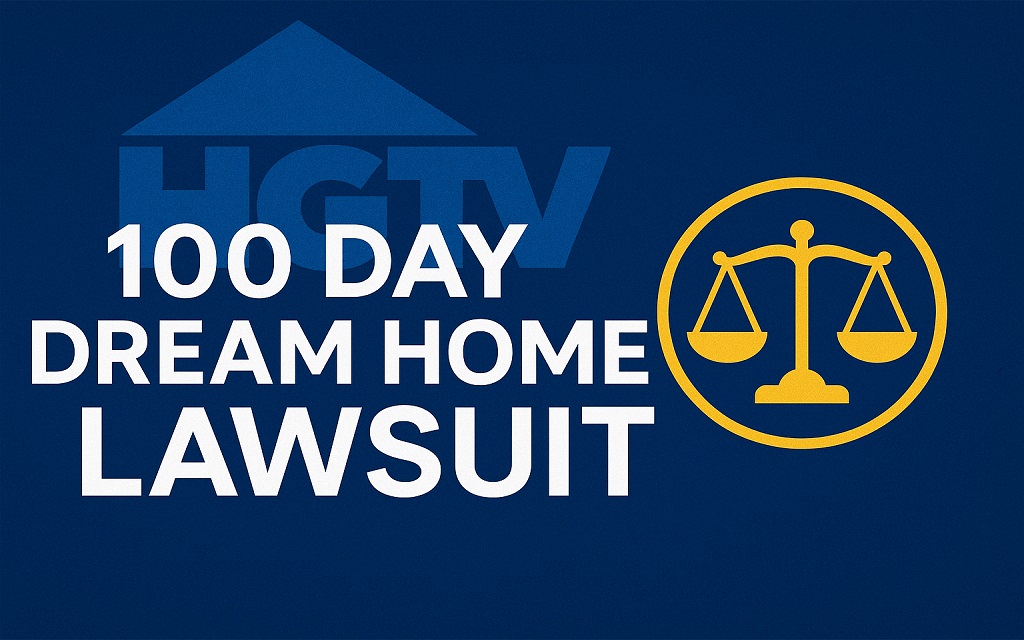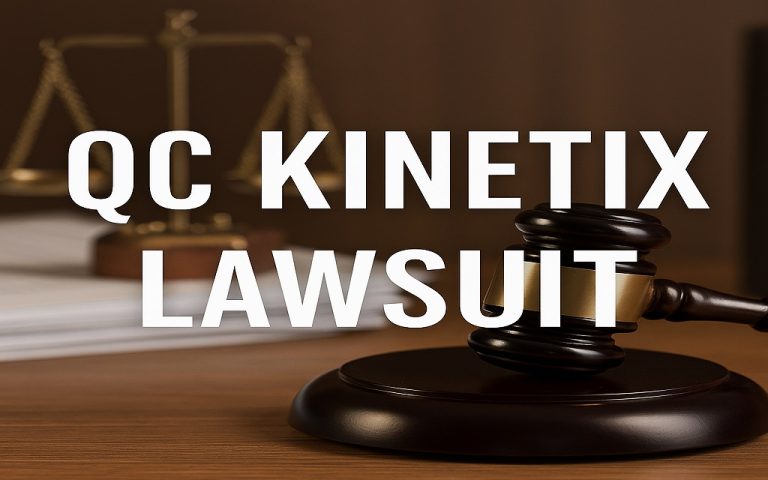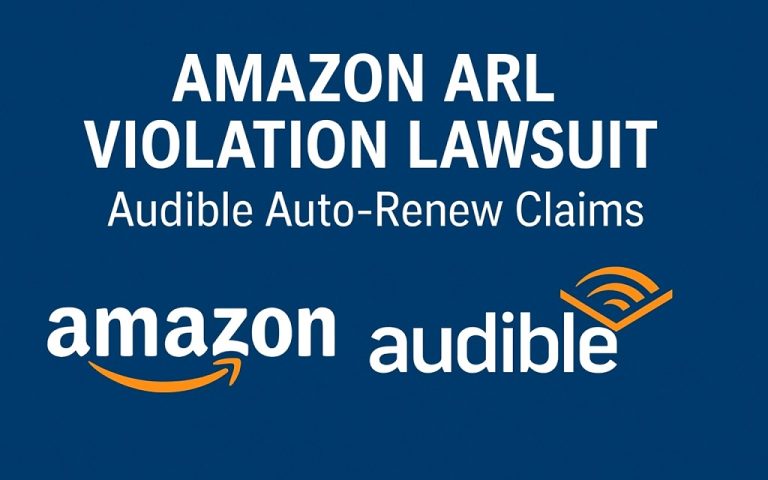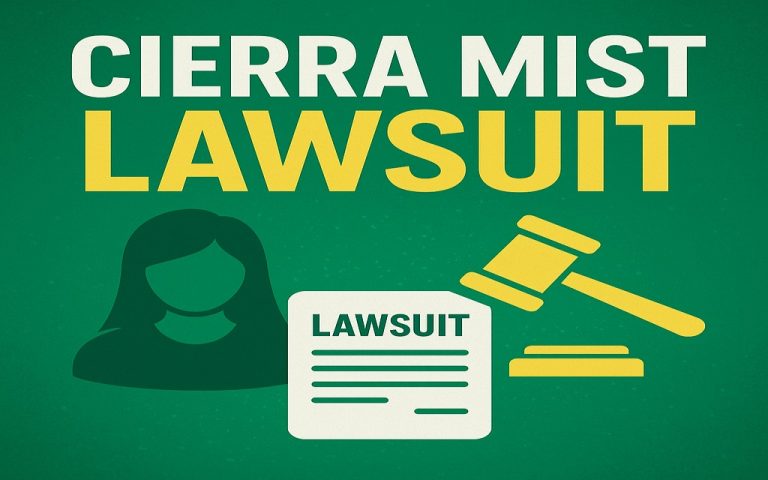The 100 Day Dream Home lawsuit has caught the attention of fans, homeowners, and legal watchers alike. But is the 100 Day Dream Home lawsuit real—or just another internet rumor? With questions flooding Google about home defects, contracts, and disputes, it’s clear that the ‘100 Day Dream Home Lawsuit’ keyword reflects growing concern around televised home renovations.
In this article, we unpack every angle of the 100 Day Dream Home lawsuit—what’s fact, what’s fiction, and what legal risks homeowners need to know before building a dream house on TV. Whether you’re a viewer, homeowner, or just curious, this breakdown gives you the clarity search engines (and real people) demand.
What Is the 100 Day Dream Home Lawsuit?
The phrase “100 Day Dream Home lawsuit” has started appearing across search engines, YouTube thumbnails, and social media. But has a lawsuit actually been filed? Or is this a case of online rumor taking hold?
As of this writing, there isn’t a publicly available court-confirmed civil lawsuit against the production team, hosts Brian and Mika Kleinschmidt, or HGTV’s 100 Day Dream Home. Online rumors and speculation, however, continue to circulate due to social media buzz, video commentary, and concerns about previous home makeover show scandals.
So why is this keyword trending?
This article explores the allegations, legal patterns, contract concerns, and search queries surrounding the show. It unpacks the legal concepts homeowners must know if they’re considering working with a televised renovation series—or if they believe something went wrong.
We’ll explain:
- Why does this topic attract legal attention
- What kind of claims usually arise in TV renovation disputes
- What protections or risks may exist in homeowner contracts
- What viewers can verify and what remains unproven
This isn’t just a fan theory piece. It’s a clear legal explainer for consumers, property owners, attorneys, and producers—designed to answer searchers’ real questions.
What Sparked the Dispute Rumors?
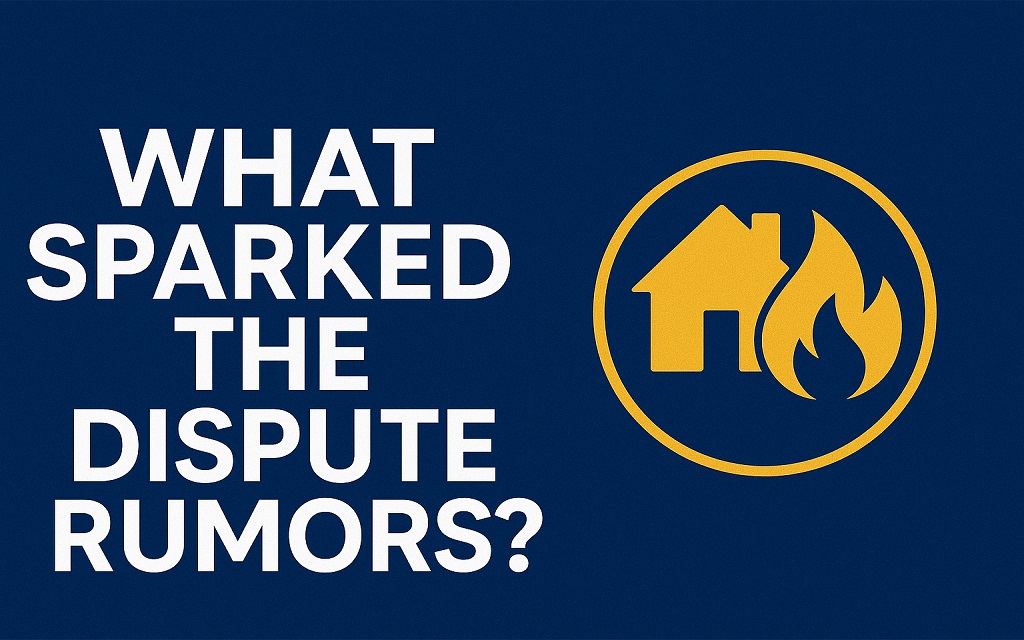
No single lawsuit sparked this viral topic. Instead, search interest surged in response to online videos claiming that homeowners featured on 100 Day Dream Home were unhappy. YouTube channels labeled “lawsuit update” or “legal trouble” began driving views by discussing possible issues with builds, timelines, or quality.
Some commenters on Reddit and other forums mentioned:
- Delays past the 100-day mark
- Concerns over workmanship
- Claimed communication gaps post-filming
- Questions about who pays for mistakes
It’s important to note: none of these sources linked to a legal complaint. That matters. A claim on a video without a case number or filing date does not necessarily indicate that a legal dispute is currently pending in court.
Still, the rumors tap into real fears. Viewers wonder: What happens if my dream build goes wrong on TV?
These questions—plus prior legal controversies involving other renovation shows—help explain why searchers now type “100 Day Dream Home lawsuit” into Google. The intent may be curiosity, caution, or genuine concern.
This article uses that intent to guide clear, fact-based answers.
Who are the people the Parties’ People discuss?
While no active case names defendants, most social speculation revolves around these known entities:
- Brian and Mika Kleinschmidt: Hosts of the HGTV show. Mika is a licensed realtor, and Brian handles project logistics.
- HGTV: The network that airs the show. Part of Warner Bros. Discovery.
- The production company: While not consistently named in public-facing materials, most HGTV shows are produced by independent firms contracted by the network.
- Homeowners: In each episode, a Florida couple contracts Brian and Mika to deliver a custom home build in 100 days.
- Local contractors: Depending on location, third-party builders, engineers, and inspectors are involved in the process.
If a dispute were to arise, it’s possible multiple parties could be involved. That includes:
- The builder issuing warranties
- The producers coordinating contracts
- The real estate side handles land and purchase
Legally speaking, parties may be either defendants (those defending) or plaintiffs (those making the claim). However, there is no official alignment or complaint on file if no lawsuit has been filed.
Still, discussing potential parties helps readers understand how liability may shift in similar TV-based projects.
Which Court Would Hear a Real Claim?
If a homeowner sued 100 Day Dream Home producers or contractors, several court venues could apply, depending on the location, contract terms, and the dollar amount.
Here’s what typically determines court jurisdiction:
- Location of the property: Almost all homes featured on the show are built in Florida. That state would likely have venue.
- Amount of claimed damages: Smaller claims (typically under $30,000 in Florida) are handled by the county court. Larger ones proceed in circuit court.
- Existence of arbitration clauses: Many TV production contracts include mandatory arbitration terms. That could shift the dispute away from public court.
If arbitration is required, the case stays private. A neutral third party hears evidence and issues a binding or non-binding decision. No jury. No media coverage.
We’ll explore how these clauses work later. For now, understand this: just because you don’t see a lawsuit doesn’t mean a dispute never existed. Some may resolve through closed-door arbitration—or get blocked from court entirely due to contract terms.
What Claims Appear in TV Renovation Disputes?

Although 100 Day Dream Home has not yet been linked to a court action, reality remodeling programs of a similar nature have been the subject of lawsuits in the past. Those lawsuits demonstrate the causes of action that could emerge in a genuine dispute.
Common claims include:
- Breach of contract: A breach of contract occurs when one party fails to meet predetermined deadlines, specifications, or quality requirements.
- Negligent construction: Alleging that the structure was substandard or hazardous.
- Fraud or misrepresentation: claiming that the program made promises it never meant to fulfill.
- Violation of consumer protection laws: Claiming that the homeowner was misinformed or did not receive disclosures is a violation of consumer protection laws.
- Unlicensed contracting: When licenses or permits don’t adhere to the law.
Specific laws, such as the Florida Deceptive and Unfair Trade Practices Act (FDUTPA), may be applicable in Florida. That law covers misleading business practices that hurt consumers. It’s also possible to allege breach of warranty, especially if the construction fails basic functionality or safety.
In short, TV builds are not immune to standard construction law. The glamor of television doesn’t erase the enforceability of real-world contracts.
What Defenses Might the Producers Use?
If a lawsuit were ever filed, the defense would likely begin by pointing to the signed agreements. Homeowners on TV shows typically sign multiple documents, including:
- Appearance releases
- Property and build contracts
- Non-disparagement or NDA clauses
- Arbitration agreements
A production company or contractor might raise these common defenses:
- “We followed the contract.”
They might argue they met all deadlines, specs, and inspection rules. If the agreement includes leeway on design or materials, that flexibility would form part of their case. - “It’s subjective dissatisfaction.”
A defense could claim that disappointment over paint color, layout, or finishes isn’t a legal breach. Only violations of measurable obligations—like code failures—would rise to liability. - “Licensed third parties did work.”
Many TV producers don’t build directly. Instead, they coordinate vendors. A contractor defense might argue that any faults rest with subs or materials manufacturers. - “The complaint is barred by arbitration.”
If the homeowner agreed to a private resolution, the court could dismiss the claim entirely and refer it to an arbitrator. - “Homeowner interfered or changed scope”
If delays or defects stemmed from changes made mid-project, the defense could reduce or eliminate damages using these facts.
In simple terms, written contracts—and whether the plaintiff complied with or violated their own obligations under them—are frequently at the center of litigation involving remodeling shows.
How Does the Contract Address Changes, Budget, and Scope?
It appears straightforward in every episode of 100 Day Dream Home: a dream home in 100 days, happy hosts, and an immediate unveiling. However, behind the scenes, contracts govern every aspect of the build.
These documents usually cover:
- Scope of work: Room count, layout, style guides
- Materials: Builder grade vs. custom choices
- Timeline: Often with exceptions for weather, inspections, or force majeure
- Budget: With clear lines on who pays for upgrades or changes
- Change order rules: How to request additions—and who approves cost jumps
Problems can arise when verbal promises don’t match written terms.
Example: If Mika says “we’ll make it amazing” on camera, but the fine print says all specs are final once approved, then a court will look only at the signed version.
Another issue? Upgrades not included in the show’s budget. Some episodes hint that the network or sponsors cover certain features. If the homeowner thought those extras were free, and they weren’t, disputes may follow.
To stay safe, homeowners must insist on detailed, dated, and signed paperwork before filming begins—and before construction starts.
Must Read: Homeaglow Lawsuit: Worker Misclassification, Legal Claims, and Class Action Updates
Do Warranties or Punch Lists Affect Liability?
Yes—and in significant ways. A warranty is a promise that a product or service will function correctly for a specific time. In new home construction, warranties usually include:
- Structural warranty: Often 10 years
- Mechanical and systems warranty: Usually 2 years
- Workmanship/materials warranty: Typically 1 year
If a dispute arises after that period, the builder may have no obligation—unless fraud or code violations can be proven. A punch list, by contrast, is a final checklist of minor fixes (like touch-up paint or a sticky door) that both parties sign off on after completion.
Here’s where things get tricky:
- If the homeowner signs the punch list and moves in, a builder may argue that all obligations are fulfilled.
- A breach claim may be made if the show’s producers fail to complete the punch list or leave specific issues unsolved.
Punch list items should always be documented with dates, photographs, and communication records. And never sign off until the work is truly complete.
Does an Arbitration Clause Limit a Jury Trial?
Almost always, yes.
Many production contracts contain an arbitration clause, which says:
“Any disputes arising from this agreement shall be resolved through binding arbitration in [City, State] under the rules of [Arbitration Provider].”
This language means:
- No court case
- No public trial
- No jury
- No appeals (in most cases)
While arbitration can be faster and private, it also limits the homeowner’s rights. For instance, class actions are often barred. Evidence rules are looser. In most situations, the decision is definitive. Even if the homeowner later changes their mind, courts in Florida and throughout the United States typically uphold these stipulations.
One possible exception? If the clause is found “unconscionable” (grossly unfair), a court might void it. But that’s rare and hard to prove. The lesson: Read arbitration language carefully. If you sign it, you likely give up the right to sue in open court.
Do NDAs or Confidentiality Terms Restrict Public Facts?

They can. And they often do.
An NDA (non-disclosure agreement) is standard in reality TV. Producers use it to:
- Control how the show unfolds
- Prevent spoilers
- Avoid public reputational harm
- Maintain the privacy of vendors or sponsors
In a home renovation context, NDAs may block:
- Talking to the press about build issues
- Posting behind-the-scenes photos
- Naming contractors or suppliers in complaints
However, NDAs cannot block you from reporting code violations or filing official complaints. You always retain the right to:
- Speak with your local building department
- Report fraud to the attorney general
- Sue if the contract or law allows
Some NDAs also include “non-disparagement” clauses, which ban negative reviews or social media posts.
Bottom line: NDAs are powerful, but they don’t override the law. Still, they may chill a homeowner’s willingness to speak—even if a valid issue exists.
What Timeline Shows Key Events and Filings?
Although no publicly confirmed lawsuit is tied to 100 Day Dream Home as of now, constructing a hypothetical legal timeline helps readers understand how these disputes usually unfold.
Here’s what a real legal timeline might look like in a home renovation lawsuit:
Project Start
- Homeowner signs contract and possibly a production agreement
- The build begins, often with a 100-day clock set on the camera
Construction Phase
- Permits pulled
- Milestone inspections occur
- Change orders or delays documented (weather, materials, crew issues)
Completion and Reveal
- Homeowner moves in
- Punch list generated
- Final walkthrough filmed
Post-Move-In Issues
- Homeowner notices defects: leaks, wiring, HVAC noise, cracks, etc.
- Reaches out to the producer or builder
- Response may be slow or restricted by NDA or contract limits
Escalation
- Warranty claims filed
- Mediation or arbitration requested
- Lawsuit filed if allowed under the agreement
Legal Proceedings
- Complaint served
- Answer filed
- Motions to dismiss or compel arbitration may occur
- Discovery phase (emails, plans, contractor records)
- Trial or arbitration outcome
This template helps homeowners and viewers understand how long legal action might take—and how fast they must act under statute of limitations rules (often 2 to 4 years for construction claims, depending on the state).
Summary Table: Facts vs. Rumors
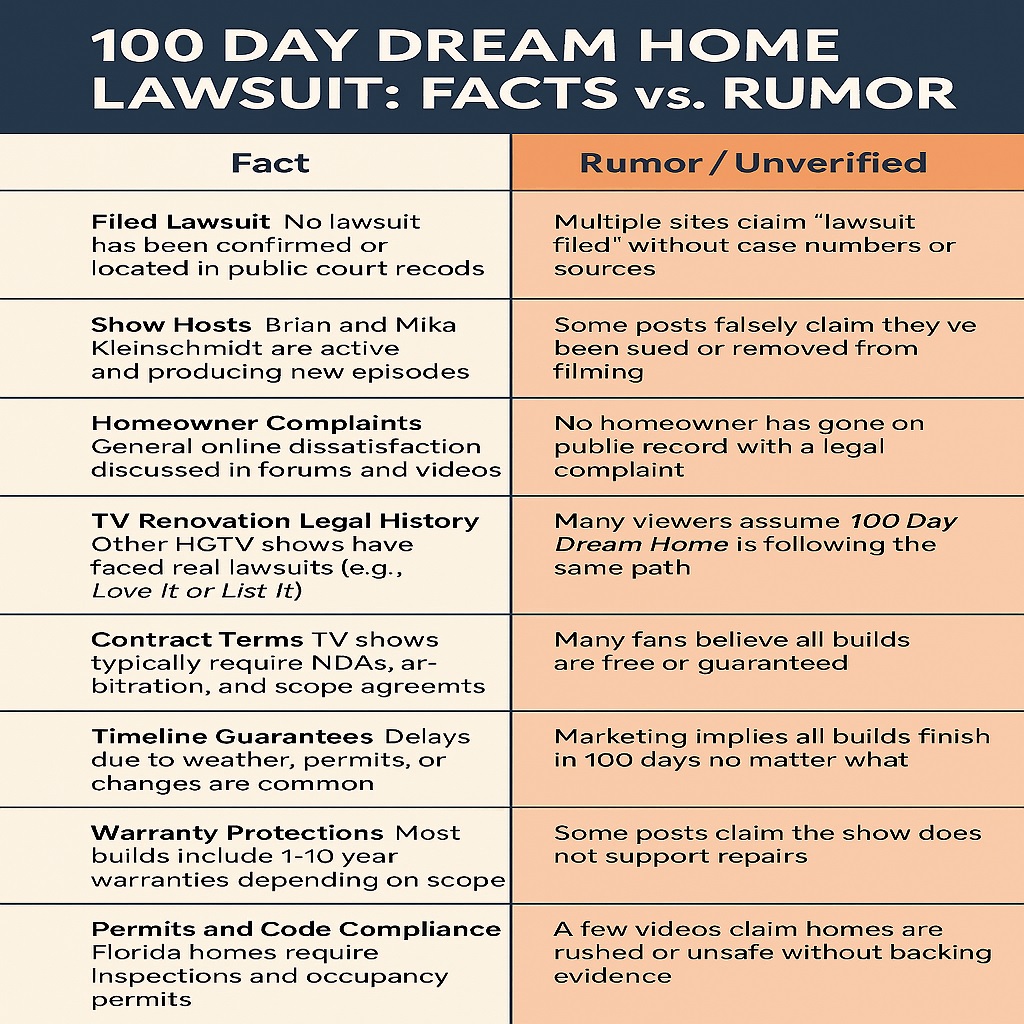
| Topic | Fact | Rumor / Unverified |
|---|---|---|
| Filed Lawsuit | No lawsuit has been confirmed or located in public court records | Multiple sites claim “lawsuit filed” without case numbers or sources |
| Show Hosts | Brian and Mika Kleinschmidt are active and producing new episodes | Some posts falsely claim they’ve been sued or removed from filming |
| Homeowner Complaints | General online dissatisfaction is discussed in forums and videos | No homeowner has gone on public record with a legal complaint |
| TV Renovation Legal History | Other HGTV shows have faced real lawsuits (e.g., Love It or List It) | Many viewers assume 100 Day Dream Home is following the same path |
| Contract Terms | TV shows typically require NDAs, arbitration, and scope agreements | Many fans believe all builds are free or guaranteed |
| Timeline Guarantees | Delays due to weather, permits, or changes are common | Marketing implies that all buildings finish in 100 days, no matter what |
| Warranty Protections | Most builds include 1-10 year warranties, depending on the scope | Some posts claim the show does not support repairs |
| Permits and Code Compliance | Florida homes require inspections and occupancy permits | A few videos claim homes are rushed or unsafe without backing evidence |
| NDAs and Silence | NDAs may prevent public complaints or media interviews | Some believe homeowners are “happy with results” |
| Arbitration Limits | Most contracts block jury trials and require private dispute resolution | Some viewers assume homeowners can sue publicly at any time |
What Evidence Could Matter Most?
In construction disputes—especially those aired on TV—evidence needs to be clear, dated, and detailed. Here’s what courts or arbitrators care about most:
The signed contract
Scope, exclusions, change order rules, timelines, and arbitration clauses
Emails and messages
Proof of promises, complaints, delays, or approval of changes
Photographs and videos
Before, during, and after shots—especially timestamps
Inspection records
Passed or failed results from city or county inspectors
Expert reports
Licensed engineer or contractor assessments showing code violations or unsafe work
The final punch list
Items noted by the homeowner and whether they were resolved
Warranty claims
Paperwork or communication showing an attempt to fix problems within the warranty period
The show footage
Ironically, the show itself can become evidence. If something promised on air differs from the contract or reality, that may be relevant.
Courts rely on documentation—not memory or emotions. Homeowners should preserve every receipt, message, and picture. Even unofficial evidence, such as text messages or social media posts, can be pretty crucial in arbitration disputes.
What Damages Could a Court Award?
If a homeowner wins a construction case—either in court or arbitration—damages may include:
Cost to repair
The amount required to bring the home up to the promised standard
Diminished value
If the home can’t be repaired thoroughly, courts may award the difference in market value.
Out-of-pocket losses
Temporary housing, furniture damage, inspection fees, or engineering costs
Emotional distress (rare)
Only awarded in extreme cases, such as dangerous or unlivable conditions
Punitive damages (rare)
Only in fraud or malicious conduct cases
Attorney’s fees and costs
Sometimes allowed under contract or consumer protection laws
Rescission
In rare cases, courts may void the contract and return parties to their pre-deal state.
But beware: damages can also be capped. Some TV contracts include liability limits, such as:
“In no event shall liability exceed the value of the contract or $25,000.”
That clause could sharply limit what a homeowner recovers—even if the build caused six-figure harm.
How Do State Consumer Laws Shape the Case?
Florida and other states provide extra protection to homeowners under consumer statutes.
In Florida, for example:
- Customers can file a lawsuit for misleading behavior under the Florida Deceptive and Unfair Trade Practices Act (FDUTPA).
- The law addresses corporate tactics, marketing, and the omission of important information.
- It applies even when no written contract exists
Other helpful consumer laws include:
- Homeowner’s Construction Recovery Fund: Helps pay claims against licensed contractors (state-administered)
- Unlicensed contracting laws: Allow voiding contracts signed by builders without proper licensure
Certain jurisdictions may provide for treble damages under consumer protection laws, which can triple the amount awarded if the court finds that the defendant acted dishonestly or in bad faith.
Consumer laws may allow claims even outside the purview of pure contract theory if the software created irrational expectations, circumvented permits, or failed to disclose modifications.
That said, many production contracts waive consumer protections. Courts may or may not enforce the waivers based on jurisdiction and fairness.
What Part Do Inspections, Permits, and Building Codes Play?
To ensure health and safety, building rules are enforced in every state and county in the United States. These codes cover:
- Structural integrity
- Electrical and plumbing systems
- HVAC and ventilation
- Fire resistance and egress
- Energy efficiency standards
If a show builds a home that violates these rules, multiple issues can arise:
- Failed inspections
- Denied occupancy permits
- Dangerous living conditions
- Code violation fines
Permit reviews and final inspections are carried out in Florida by municipal authorities, such as those in the City of Tampa or Hillsborough County. If 100 Day Dream Home homes didn’t meet those standards, affected homeowners could file:
- Code complaints
- Civil lawsuits citing negligence
- Complaints to contractor licensing boards
Homeowners can search public permit databases to check:
- Dates of permit issuance
- Names of responsible contractors
- Final inspection results
- Certificate of occupancy approval
A failure in any of these areas strengthens a legal claim. On the flip side, a passed inspection record often helps the defense.
What Do Past TV Renovation Lawsuits Teach Us?
While 100 Day Dream Home isn’t confirmed in court, other shows have faced real legal trouble. These past lawsuits reveal the patterns—and risks—of televised remodeling.
Notable cases include:
- Love It or List It (North Carolina, 2016)
Homeowners sued producers for defective work and mismanagement. They alleged the design was ignored, substandard materials were used, and some changes were made without consent. The case settled privately. - Property Brothers (Nevada, 2021)
A Las Vegas couple claimed that the shoddy craftsmanship and construction delays were unacceptable. They sued for over $1 million, citing misrepresentation and emotional stress. According to reports, third-party contractors were involved in the conflict. - Island of Renovation (2023)
The Baeumler-led series was subject to permit scrutiny and timeline concerns, but it was not a lawsuit. No formal claims were filed, but it raised concerns among fans over the real-world feasibility.
Common threads:
- Homeowners often felt misled about control or cost
- Claimed contractors were rushed or changed during filming
- Conflicts centered on confidentiality provisions, incomplete work, and warranty malfunctions
Producers frequently use arbitration or out-of-court settlements to shield themselves from public scrutiny. Jury verdicts are uncommon in these circumstances. However, they reveal how TV sparkle can mask legal sparks.
What Should Homeowners Check Before Joining a TV Show?
If you’re considering working with a renovation show—or are already filming—protect yourself early. Here’s what to verify:
1. Licensing
- Confirm the contractor’s license with your state board
- Make sure insurance and bonding are current
- Ask who actually pulls the permits
2. Scope of work
- Demand a detailed, itemized list of deliverables
- Clarify upgrade costs and what’s covered by the show
- Get timelines in writing
3. Warranties
- Confirm how long you’re protected after completion
- Get written terms, not just what’s said on camera
4. NDAs and releases
- Read every clause
- Ask what you’re allowed to say publicly
- Watch for “non-disparagement” terms
5. Arbitration clauses
- Know whether you’re giving up the right to sue
- Understand the rules of the arbitration provider
- Ask about the venue and cost-sharing
Your dream home should not come with a nightmare contract. Secure neutral legal review before you sign.
What Should Producers and Brands Fix to Reduce Risk?

TV producers, sponsors, and networks must mitigate liability. That means tight processes, clear terms, and documented delivery.
Key strategies:
- Use licensed builders with long-standing reputations
- Create duplicate copies of every signed document
- Record change orders on camera and in writing
- Build in buffer time beyond the on-air timeline
- Honor reasonable warranty requests, even off-camera
- Avoid overpromising finishes or timelines on film
Brand partners (e.g., paint, appliance, and furniture companies) must ensure their products are installed correctly. A failed component hurts both the homeowner and the brand’s credibility.
Transparency isn’t just ethical—it’s risk management.
Must Read: Home Depot Class Action Lawsuit: What You Need to Know
What Myths About TV Remodels Hurt Homeowners?
Television creates expectations that often don’t match reality. Here are the most dangerous myths:
- “The show pays for everything.”
In reality, homeowners often contribute to land purchase and some materials. Upgrades can cost extra. - “It’s guaranteed to finish on time.”
Weather, permit delays, and supply chain issues still apply—even on camera. - “I can sue if anything goes wrong.”
Arbitration clauses may block court access completely. - “Everything shown on TV is real-time.”
Most reveals are staged. Finishing touches may still be pending when filming wraps. - “I can speak out later if it goes bad.”
NDAs may restrict complaints. And reputational fear silences many participants.
Understanding these myths—and reading the contract—helps homeowners enter TV deals with clear eyes.
What Open Questions Remain Right Now?
100 Day Dream Home is still in production as of right now. There are no publicly verified case numbers, litigation, or official disputes.
However, essential questions still exist:
- Has a homeowner submitted a complaint for confidential arbitration?
- Have warranty claims been made and resolved privately?
- Do homeowners feel pressured to stay silent due to contract terms?
- Are local inspectors catching issues before reveal day?
These queries fuel ongoing rumors until actual court filings appear, but they also highlight legitimate concerns about televised builds. As of September 2025, this article is still up to date and will be revised in response to any new court documents.
FAQs
Does the 100 Day Dream Home lawsuit exist, or is it merely a rumor?
It’s a rumor as of the right moment. No case has been filed or made public that the court has validated.
Are there any complaints about the 100-Day Dream Home?
Some viewers on Reddit have criticized the show’s pacing and hosts’ tone, calling elements “obnoxious”—but these remain personal opinions, not legal complaints.
Was the 100 Day Dream Home cancelled?
No, the show’s production will resume in the fall of 2025 after being renewed for a sixth season.
Are Mika Kleinschmidt and Brian still wed?
Yes—they married in October 2015 and remain together.
What was Mika’s weight loss on 100 Day Dream Home?
Mika went from being about 200 pounds to 156 pounds in about a year, losing about 44 pounds.
Is Mika Kleinschmidt’s daughter biological?
Yes—her biological child from a previous relationship is her daughter Jade, who was born in 2009.
How do Brian and Mika make money?
They’ve built their income through TV production on 100 Day Dream Home, real estate development, and previously co-owned multiple Anytime Fitness gyms.
Conclusion: Know the Law Before You Build on Camera
Although the 100 Day Dream Home lawsuit is not currently pending, reality TV renovations carry significant legal dangers. Protect your rights as a homeowner before the cameras start to roll.
Enforce fairness and openness at every stage if you’re a producer or brand partner. Renovation shows inspire millions. But dreams must be built on solid legal ground—or they risk collapse.
Disclaimer: This article provides a general overview of the 100 Day Dream Home lawsuit, based on publicly available information, and is intended for informational purposes only. It does not provide legal advice. You must consult a licensed attorney for any legal decisions.
Musarat Bano is a content writer for JudicialOcean.com who covers lawsuits, legal news, and general legal topics. Her work focuses on research-based, informational content developed from publicly available sources and is intended to support public awareness. She does not provide legal advice or professional legal services.

